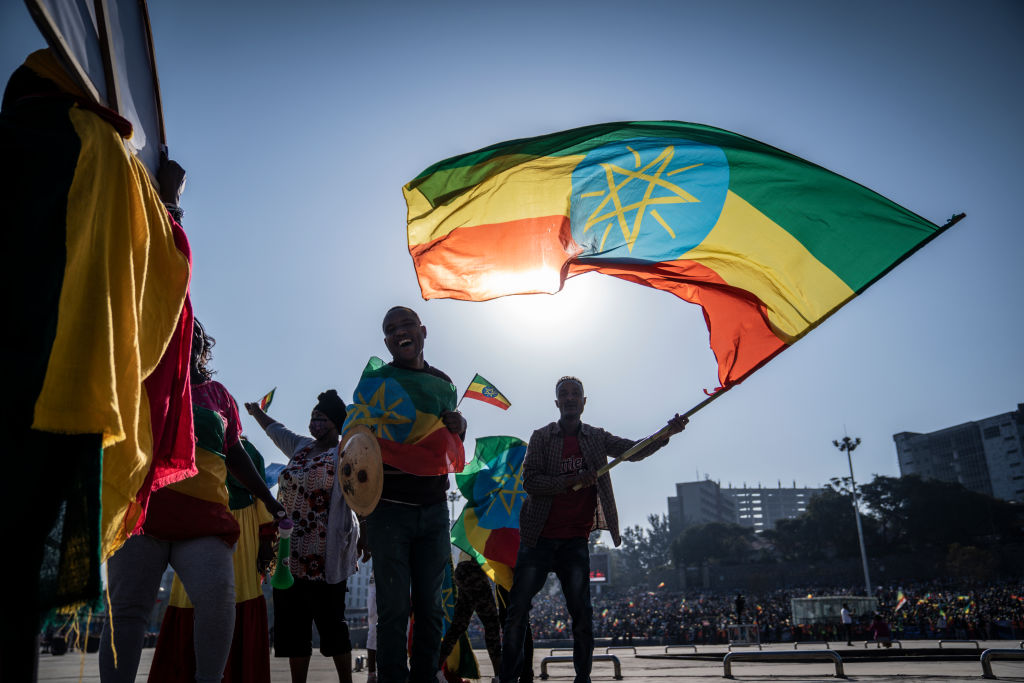If Robert Kaplan’s The Loom of Time: Between Empire and Anarchy, from the Mediterranean to China had not been released earlier this year, one could imagine him scrambling to rewrite the introduction of his wide-ranging treatise on political order in the Middle East in light of recent events. After all, the merciless Hamas terrorists responsible for the attacks in Israel had once been the unexpected beneficiaries of elections that U.S. officials had hoped would produce a moderate Palestinian government. Yet following their victory in the 2006 Palestinian legislative polls, Hamas promptly executed political rivals, extended an iron grip over the Gaza Strip, and began building the terrorist command-and-control capabilities gruesomely displayed on October 7. The 2006 elections were Gaza’s last.
Kaplan—a longtime foreign affairs reporter for The Atlantic and a researcher at the Foreign Policy Research Institute—argues in his latest book that stability in the Middle East is elusive. Chaos, in his view, always lurks beneath the surface, and elections fail to produce peace in a region with such acute fault lines. The past few weeks sadly seem to bolster his pessimistic claims.
Kaplan has made some essential contributions in his time—his work recentering the primacy of geography in international relations stands out—as well as a few alarmist dispatches that don’t hold up as well. This latest book seems principally concerned with atoning for Kaplan’s initial support for the Iraq War, which he now considers his greatest failure as a writer. If Kaplan’s self-professed hatred for Saddam Hussein’s totalitarianism blinded him to the risks of an intervention in 2003, The Loom of Time warns against similar involvement in the Middle East.
Kaplan’s latest work is a characteristically informative and enjoyable mix of travelog, history, and geopolitical analysis. It’s refreshingly provocative in some important regards, but also repetitive and simplistic in places. Yet few authors are in the position to write such a book as Kaplan, one that blends decades of first-person reporting in the region with a broad familiarity with Middle Eastern history and societies.
The Loom of Time begins with two epigraphs. In the first, the Hellenistic-era historian Polybius claims that comparative studies of history are more useful than specialist accounts of any particular figure or region. In the second, the British philosopher Edmund Burke asserts that, “Rage and phrensy will pull down more in half an hour, than prudence, deliberation, and foresight can build up in a hundred years.”
In a way, those are the two principal arguments of Kaplan’s book. He feels that a narrow conceptualization of the Middle East’s geography has resulted in siloed and incomplete analysis. He regards the region as an interconnected social, political, and cultural system not limited to the Arab world—or the Arab world plus Turkey and Iran—but rather which stretches from the Horn of Africa and the Mediterranean in the west toward the steppes of present-day China in the east. Absent such an expansive view of the Middle East’s geography and history, Kaplan claims, we risk being blind to historic changes in the political-economic order in the region that are set to upend Western influence.
Kaplan’s second, more forceful argument is that the root causes of the Middle East’s fractious politics necessitate a “realist” foreign policy toward the region, one that prioritizes order over liberty. The alternative, he argues—with no shortage of historical evidence—is anarchy.
Kaplan is strongest in writing sweeping overviews à la Polybius. He interweaves historical narratives of the Greater Middle East with descriptions of the region’s landscapes and cultures in a way that shows an appreciation for the likes of Herodotus and Ibn Khaldun. He notes in his introduction that he began traveling in China’s remote western provinces as early as 1994, long before the plight of the Uyghurs made headlines in the West. Early on he appreciated that these peripheral regions would be the locus of China’s neoimperialist and mercantilist efforts to acquire global hegemony.
“The Greater Middle East is the fight zone for these ghost empires: the vast puzzle piece that China needs to command, if it can link its budding commercial outposts in Europe with those in East Asia,” Kaplan writes.
His penultimate chapter on Afghanistan and Pakistan likewise contrasts China’s Belt and Road Initiative with American alliance-building among littoral states in the Indo-Pacific. The former evinces a “Heartland” strategy, as conceived by the late-Victorian geographer Halford Mackinder, in which global power is determined by whoever can unite and harness the potential of the Eurasian landmass. The latter a reflection of political scientist Nicholas Spykman’s “rimland” theory, which places primacy on control of the Indo-Pacific coasts over the Eurasian interior. Kaplan is not the first to draw this comparison, but his years of writing on geopolitics—long before it was fashionable in Western foreign policy circles—gives greater weight to his prognosis that “the Rimland and the Heartland are about to fuse in the coming years” with China clearly eyeing the prize.
In contrast, Kaplan’s arguments for a sort of realist approach to the Middle East, though seemingly prudent on the surface, become repetitive and somewhat reductionist as the book progresses.
Kaplan surveys, with understandable disappointment, years of American missteps in the Middle East and a decade of fallouts from the Arab Spring. He concludes that pragmatism and moral compromise are preconditions for any successful foreign policy toward the region. “Rather than pine exclusively for democracy in the Greater Middle East, we should desire instead consultative regimes in place of arbitrary ones,” he writes. “That is, regimes that canvass public opinion even if they do not hold elections.”
This is a reasonable approach to take to some of the more tranquil hereditary monarchies of the region, to a point. But not only does Kaplan’s argument come off as a bit of a straw man—there is not, to my knowledge, a strong lobby in Washington for regime change in Morocco or Oman—the proscription is also not of much help in guiding U.S. policy.
Take a country like Egypt as an example, where the regime is simultaneously violent and uninspired. (Authoritarians can typically get away with being one, but both is a tough sell.) Any semblance of a social contract in Egypt exists at the mercy of the Gulf petrodollars that prop up the economy, and the increasingly repressed civil society is unable to produce viable political alternatives. Since it is not clear what pushing for a “consultative” authoritarian in Egypt would entail, short of resurrecting the corpse of Anwar al-Sadat, Washington is stuck dealing with a regime eerily similar to the former one of Hosni Mubarak, whose listlessness helped generate the Arab Spring in the first place.
Shortcomings of the so-called realist approach are also seen clearly in the case of Ethiopia, which Kaplan describes in the book as “an outpost of Middle Eastern and Semitic civilization on the continent of Africa.”
At the time that Kaplan traveled to Ethiopia in 2021, the country was in the midst of a brutal civil war. Only three years earlier, the young Abiy Ahmed had become prime minister and promptly won the Nobel Peace Prize for a slew of political reforms and lofty rhetoric about national reconciliation, a decision that the Nobel committee no doubt began to regret the following year when Ethiopia descended into war. Kaplan notes that the battlefield changed dramatically over the weeks and months following his visit in mid-2021. Well-trained ethnic Tigrayan fighters (led by those who had dominated the country’s politics and security forces for 27 years prior to Abiy’s ascent) nearly reached the capital city of Addis Ababa in a stunning offensive before being pushed back by Ethiopian troops with the support of Turkish and Emirati drones that Abiy had managed to secure at the eleventh hour.
The war continued for another year and then, to the surprise of most observers, abruptly came to an end at the start of November 2022. Ethiopian forces dealt a decisive blow to Tigrayan forces in a massive, multifront assault in the country’s north. Reports I heard from Ethiopian sources suggest tens of thousands of soldiers from both sides may have died in the last six weeks of fighting alone.
Needless to say, the naïve hopes that many American policymakers had held for Abiy the peacemaker upon his appointment in 2018 had dissipated by November 2022, after two years of massacres, mass rapes, and the targeted starvation of Tigray’s civilian population. The “realist” strategy from the U.S. and other Western powers has since been to accept the fait accompli of a decisive, if destructive, Ethiopian military victory, paying lip service to the need for “transitional justice,” “reconciliation” and the like, while working with Abiy to resume some of the development aid that had been suspended during the war. It is hard to imagine the U.S. doing anything differently, given its limited understanding of the facts on the ground during the war, let alone any ability to influence outcomes one way or another.
But if Abiy and his advisers looked for a moment to have been master strategists who triumphed over the effete protests of the Western human rights complex—i.e., the sorts of strong-armed statesmen whom Kaplan seems to not-so-secretly admire—they now look nearly as vulnerable and clueless as they did when they stumbled into war with the Tigrayans three years ago. Since the start of 2023, Ethiopia’s military has been drawn into an escalating set of counterinsurgency operations that by now arguably constitute a second civil war, this one an entirely predictable clash that pits Abiy’s government against its erstwhile allies from the last civil war. Abiy remains in power but with a reduced support base. It is not too far-fetched to think that he may eventually face a new rebel assault on Addis Ababa like the one he narrowly averted in 2021.
And therein lies the challenge of positing a dichotomy between “realism” and, for lack of a better word, “idealism” in American foreign policy. Stable authoritarian regimes may be preferable to ill-conceived democratic experiments in the Middle East. But how many authoritarian regimes in that region are truly stable? If a country like Ethiopia can experience two civil wars (one-and-a-half, if we’re being generous) in the span of as many years, how much stock should Washington put into cozying up to any one particular regime? After all, no autocrat in the Middle East is immortal, however shrewd he may be. (Just ask the Yemenis.)
There aren’t any slam-dunk answers in The Loom of Time, but it’s not a mark against Kaplan’s book that he cannot offer a silver bullet for the Middle East. He seems to desire a return of enlightened, quasi-imperial rule to the region, akin to the Ottoman Empire, yet he concedes that any imperial competition between the likely contenders for suzerainty today (e.g. China, Russia, or India) could be quite intense. Perhaps the principal takeaway from his book, though buried deep in the text, is that we should not assume that any scenario is off the table when it comes to the future of the “Greater Middle East.” As he notes in his chapter on Ethiopia, when considering the prospects of state collapse: “Mistakes occur in analysis often not by a failure of reason, but by a failure of imagination.”








Please note that we at The Dispatch hold ourselves, our work, and our commenters to a higher standard than other places on the internet. We welcome comments that foster genuine debate or discussion—including comments critical of us or our work—but responses that include ad hominem attacks on fellow Dispatch members or are intended to stoke fear and anger may be moderated.